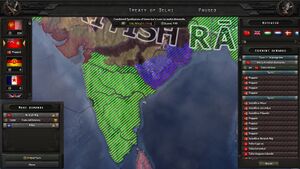A peace conference allows the victors of a war to make lasting changes to the status of the losing countries, such as annexing them or liberating new nations from their territory.
触发
和平会议是由一个处于战争中的国家失去过多的胜利点而触发的,一旦到达了指定的投降界限,其国家就会被迫停止抵抗。如果是一个阵营的国家同时处于战争状态,那么只有所有参战的国家投降了才能触发和平会议。
当然战争不利一方也可以提出和谈。 在这种情况下,占优势一方可能会拒绝提出和谈的决议,如果这样,那战争依旧会继续。
Setup
In the case of unconditional surrender, the peace conference is created between the country that was forced to surrender (recipient) and the enemy that has the highest war participation against it (actor). The countries participating on the winning side are determined as follows:
- any country that is at war with the recipient and is not at war with the actor
- if any two of those countries are at war with each other
- remove the non-faction member if exactly one of them is in the same faction as the actor
- remove both otherwise
- remove any countries that are more than 50% occupied by non-allied winners of the war (e.g. in a historical outcome Poland does not take part as a winner because they are occupied by the Soviet Union)
The losing side contains all countries that
- fulfill the conditions for surrender above
- are at war with all winners
- at peace with the recipient
- have at least some war participation dealt against them
- or were removed from the winning side due to being occupied
分数
每一个在战争中获胜的国家得到的分数相当于他们对在战争中为击败敌国所奉献的代价。战胜国可以在和平会议中利用这些分数,依次提出其要求。每当一个战胜国在属于它的谈判回合中跳过,它在跳过后所获得的分数等于它在它会议开始时分数的20%。
回合
最高战争分数的国家最先提出要求。然后提出要求的资格会流转到剩余分数最高的国家。这意味着,如果分数很高的国家频繁地跳过多拿分,分数较少的国家可能永远也轮不到提要求,甚至这些国家的分数少到从一开始就不够提要求的。一旦某个国家提完了一项要求,在此后的会议中,该项要求无法被推翻。
根据国家特定的规则,可以提出以下要求:
一个国家可以为另外一个国家提出要求(在左侧的列表中选对应的国旗),但仍需要花费自己的分数。不同的动作会花费不等的分数,根据相关的战争目标、意识形态和领土宣称的情况引发世界紧张度。
一个国家一轮能够花费的分数是其剩余分数的30%和与第二名之差中的较大值。
AI
AI国家的行为很大程度上取决于它们的意识形态。
民主主义
民主主义国家十分倾向于解放国家,尤其是被解放国也是民主主义的。它们倾向于把非民主主义国家政府改组成民主主义的,并且基本不获取领土,除非它们对特定的领土有宣称。民主主义国家不能在和平会议中傀儡他国,但可以释放傀儡。
共产主义
共产主义国家倾向于傀儡降国,避开海外区域。
法西斯主义
法西斯主义国家倾向于吞并,但也会在其他大陆上建立傀儡政权。
中立主义
中立主义国家倾向于保持沉默,大多只会吞并有核心的领土。
判决
在所有战胜国提完各自的要求之后,或者在有条件投降的情况中战败国一方同意被提出的条件之后,就要执行谈拢的条约了。战争的双方终止战争状态,领土的控制权依照战胜国的要求发生变化。世界紧张度相较引发战争产生的世界紧张度下降一定比例,但战胜国提出的要求产生的世界紧张度往往比下降的要多得多。
